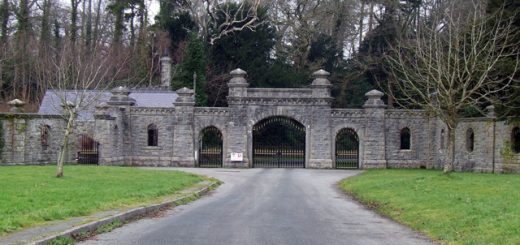Lord Brougham’s Experience
Henry Peter Brougham, 1st Baron Brougham and Vaux (Born 19 September 1778 – Died 7 May 1868), Lord Chancellor of Great Britain, was born and brought up in Edinburgh. According to his autobiography, ‘The Life and Times of Henry, Lord Brougham’ he had a strange experience whilst travelling in Sweden.
Dec. 19. — We set out from Gottenborg at nine, determining to make for Norway, in the almost cer-tain expectation of finding a vessel there for some port in Scotland. After driving up the valley, and crossing the river by the drawbridge, we came to a ferry under the Castle of Bohus, now in ruins, but which must have been a place of no small strength. Its ramparts are of stone, and very high. It is built on a rock, and surrounded wholly by the river’s branches. The view from it extremely romantic; everywhere around are huge rocky masses, with a few trees scattered about The valley on one side, on the other the river’s branches meeting under the neat town of Kongelf, and disappearing among the rocks. The wooden bridge here was destroyed by the Danes in 1787, the stumps only remaining, so that a ferry is now established; and we were stopped for about two hours, in the most intense cold, till the ice could be broken. At Kongelf we stopped to eat some of our cold provisions, and then continued our journey in the dark. The carriage being shut we were not actually frozen, but the road was execrably rough, and we went at a foot’s pace ; besides, it was more hilly than is usual in Sweden. At one in the morning, arriving at a decent inn, we decided to stop for the night, and found a couple of comfortable rooms.
“Tired with the cold of yesterday, I was glad to take advantage of a hot bath before I turned in. And here a most remarkable thing happened to me, so remarkable, that I must tell the story from the beginning. After I left the High School (in Edinburgh), I went with G, my most intimate friend, to attend the classes in the University. There was no divinity class, but we frequently in our walks discussed and speculated upon many grave subjects, among others, on the immortality of the soul, and on a future state. This question and the possibility, I will not say of ghosts walking, but of the dead appearing to the living, were subjects of much speculation; and we actually committed the folly of drawing up an agreement, written with our blood, to the effect that whichever of us died first should appear to the other, and thus solve any doubts we had enter- tained of the ‘Life after Death.’
“After we had finished classes at the College, G went to India, having got an appointment there in the Civil Service. He seldom wrote to me, and after the lapse of a few years, I had almost forgotten him; moreover, his family having little connection with Edinburgh, I seldom saw or heard anything of them, or of him through them, so that all the old schoolboy intimacy had died out, and I had nearly forgotten his existence. I had taken, as I have said, a warm bath; and while in it and enjoying the comfort of the heat after the late freezing I had undergone, I turned my head round towards the chair on which I had deposited my clothes, as I was about to get out of the bath.
On the chair sat G, looking calmly at me. How I got out of the bath I know not, but on recovering my senses I found myself sprawling on the floor. The apparition, or whatever it was that had taken the likeness of G , had disappeared. The vision produced such a shock, that I had no inclination to talk about it, or to speak about it even to Stuart; but the impression it made upon me was too vivid to be easily forgotten; and so strongly was I affected by it, that I have here written down the whole history with the date 19th December, and all the particulars as they are now fresh before me, No doubt I had fallen asleep; and that the appearance presented to my eyes was a dream, I cannot for a moment doubt, yet for years I had had no communication with G , nor had there been anything to recall him to my recollection ; nothing had taken place during our Swedish travels, either connected with G or with India, or with anything relating to him or to any member of his family. I recollected quickly enough our old discussion, and the bargain we had made. I could not discharge from my mind the impression that G must have died and that his appearance to me was to be received by me as a proof of a future state.”
This was on December 19, 1799. In October 1862, Lord Brougham added as a postscript : “I have just been copying out from my journal the account of this strange dream: certissima mortis imago. And now to finish the story begun about sixty years since. Soon after my return to Edinburgh, there arrived a letter from India, announcing G ‘s death ! and stating that he had died on the 19th of December.”
It would be hard to pinpoint the exact location in which this experience occurred, so the map shows Bohus Castle, which is mentioned above and should illustrate which part of Sweden Brougham was travelling through.



Recent Comments